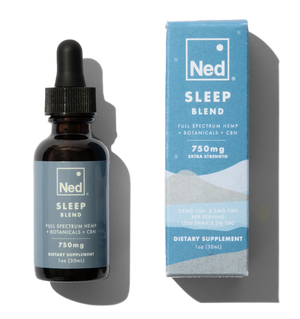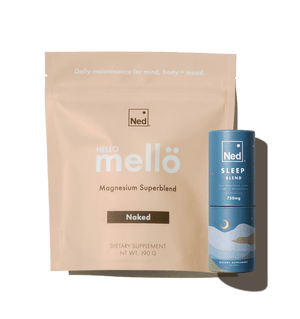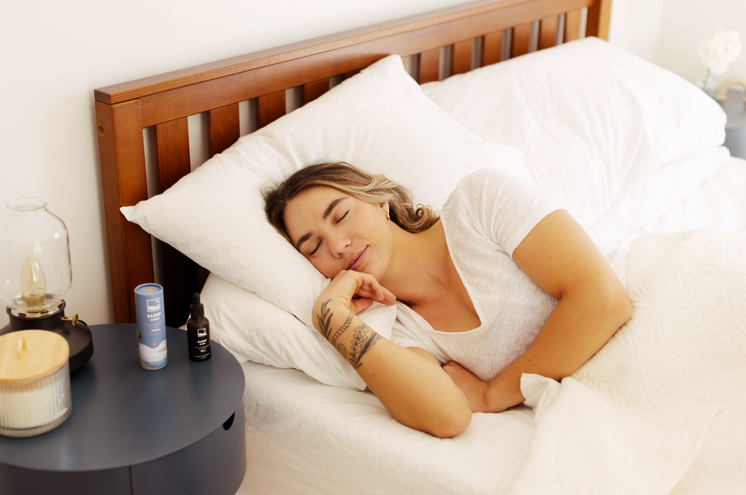Sleep Blend
Sleep deeper, longer and wake up refreshed with Sleep Blend — the natural path to deeper sleep. This organically made tincture tincture blends CBN — a powerful cannabinoid that promotes sleep, full spectrum hemp from the purest single source hemp flower extract and organic botanicals used in traditional medicine.
60-day Stress Free Guarantee
Simply place your order. Your 60-day trial begins from the day your order is delivered.
Start using your Ned product. Our Customer Happiness Team is here to give you all the guidance you need.
If you want to break things off, no hard feelings. Contact our Customer Happiness Team and they’ll help you out. Simple.
**Valid for one product at a time - bundles not eligible
Does Hemp Oil Actually Improve Sleep?
Research suggests that hemp oil, or more specifically, full spectrum hemp oil which is rich in CBD, CBN, and other phenolic compounds with sedative properties such as terpenes may be a promising natural sleep aid.
Hemp oil is rich in a group of secondary plant metabolites with antioxidant properties and varied biological activities of significant importance. These are known as phenolic compounds.
Studies have established a clear link between hemp phenolic compounds (e.g. cannabinoids, terpenes, flavonoids, etc.) and sleep quality, supporting hemp's role as a sleep remedy with few to no side effects.
Research | Cannabinoids | THC for Sleep | CBD for Sleep |Non-Cannabinoid Phenolics | How To Use
CBD, THC, CBN, and other cannabinoids interact with our body’s endocannabinoid system as well as other molecular targets located throughout the body.
Implicated in a wide variety of biological functions, endocannabinoid signalling has been shown to play an important role in the regulation of the circadian rhythm and sleep-wake cycle processes (Vaugn, et al 2010) indicating that the endocannabinoid system has the capability to modulate circadian rhythms (Sanford, 2008).
When our endocannabinoid systems are activated by either internal (i.e. anandamide or 2-AG) cannabinoids or external cannabinoids like CBD, CBN, or THC, a number of beneficial reactions are triggered in our bodies.
Sedation, anxiolytic effects, neuroprotection, neurogenesis or the formation of new brain cells, anti-inflammatory effects, pain relief, a boost in metabolism, feelings of improved well being and a positive impact on brain levels of the depression-related neurotransmitter serotonin have all been observed.
In light of these effects, it is somewhat unclear how much of the sleep improvements experienced by hemp oil users are related to these other benefits versus a direct effect on the sleep cycle.
Hemp Oil Cannabinoids
Cannabinoids such as CBD, CBN, and THC are a unique type of phenolic compound produced by hemp flowers or buds. They are unique because they can interact with our body's endocannabinoid system, which plays an important role in sleep and relaxation.
Cannabidiol, or CBD, the main cannabinoid found in hemp oil has been found to lead to sedation or sleepiness in higher doses and wakefulness in lower doses. In contrast, cannabinol (CBN) has the opposite effect: triggering sedation in low doses and wakefulness in higher doses.
Unlike the high producing tetrahydrocannabinol (THC), CBD and CBN do not make you high. They also have not been reported to lead to major negative psychological side effects such as anxiety, paranoia, and memory impairment, making their therapeutic benefits useful in everyday situations.
While the majority of cannabis research has focused on the cannabinoids CBD and THC, recent findings suggests that the cannabinoid CBN may be an even more potent sedative than other cannabinoids found in hemp.
Because the amount of CBN, even in full spectrum hemp oil, is limited, we created a CBD + CBN Sleep Blend oil that features added CBN along with organic and wildcrafted botanicals such as Oatstraw, Lemon balm, Passionflower, and Skullcap used in traditional sleep remedies.
WHAT IS REM SLEEP?
REM is the 5th stage of sleep and happens throughout the sleep cycle. Experts believe REM sleep helps us process emotions and solidify certain memories.
THC for Sleep
Though the link between cannabinoids and the sleep cycle was established decades ago, it was limited by our incomplete understanding of cannabis and its constituents.
Early research from the 1970s included several sleep studies that recorded brain waves, blood oxygen level, heart rate, and breathing, as well as leg and eye movements. These studies found that cannabis had an effect on sleep, but perhaps because they mainly looked at THC rich marijuana, their findings were mixed.
For instance, one THC study showed a decrease in sleep onset latency, or the time it takes individuals to transition from full wakefulness to sleep (Cousens & DiMascio, 1973), while different studies did not replicate these findings.
Another study examining the effects of THC observed increased waking after sleep onset and a decrease in REM sleep (Pivik et al, 1972). REM, or rapid eye movement sleep, is a phase of sleep unique to birds and mammals. It is generally characterized by low muscle tone throughout the body, vivid dreaming, and random/rapid movement of the eyes.
REM is the 5th stage of sleep and happens throughout the sleep cycle. Experts believe REM sleep helps us process emotions and solidify certain memories, but researchers are unclear as to how much REM sleep is optimal and whether varying amounts can be pathological. For example, one recent study found an association between higher amounts of REM sleep and depression, but it was unclear whether one caused the other.
Other THC work from this period found a decrease in slow-wave sleep latency, an increase in slow-wave sleep, and an increase in total sleep time (Feinberg, et al. 1975 & Barratt et al, 1974). Slow-wave sleep, or SWS, refers to phase 3 of the sleep cycle. Thought to play an important role in memory consolidation, SWS sleep is the deepest phase of non-rapid eye movement (NREM) sleep. Sleepwalking and dreaming can occur during SWS.
As the research community’s understanding of cannabis and its constituents became more sophisticated and the varying effects of different cannabinoids were discovered, researchers began focusing on the types of cannabinoids (THC vs CBD vs CBN), the ratio of cannabinoids, dosage, the timing of administration, and the route of administration, all of which have been demonstrated to play a critical role in sleep outcomes.
CBD for Sleep
CBD has been found to have biphasic effects on wakefulness. In low doses, CBD acts as a stimulant (Carlini & Cunha, 1981, Nicholson et al 2004). In medium and higher doses CBD exhibits sedative properties (Nicholson et al 2004, Zuardi 2008). These sedative properties have made CBD a viable research target for sleep disorders.
In 1981, Carlini and Cunha published a CBD study on individuals with insomnia. They showed that administration of 160 mg/day of CBD resulted in increased total sleep time and decreased frequency of nighttime arousals. Although their study showed that CBD administration reduced dream recall, they did not find CBD to produce any ‘hangover’ effects.
In 2004 Nicholson and colleagues published a pilot study in humans showing that high-dose CBD was associated with sleep improvements. Further, unlike the use of THC as a sleep aid, which studies have reported to produce next-day memory impairment as well as increased sleepiness and mood changes, CBD did not appear to result in these negative side effects.
In a 2012 study examining the effect of medium and high dose CBD in rats, Hsiao and colleagues found that CBD blocked anxiety-induced REM sleep suppression and increased the percentage of total sleep time.
Similarly, in 2013, Chagas and colleagues published a study that found an increase in the total percentage of sleep in rats after the administration of mid-range and high-dose CBD injections as compared to placebo.
The following year, Chagas and colleagues published another study on four adults with REM sleep behavior disorder (RBD) and Parkinson’s disease. RBD is characterized by the loss of muscle rigidity during REM sleep accompanying nightmares and can involve individuals acting out behaviors associated with dreams. Their study found that CBD was tolerated well by all patients and efficacious in suppressing behaviors associated with RBD.
A recent and allegedly first of its kind double-blind, placebo-controlled randomized clinical study from the Center for Applied Health Sciences looked at the effects of CBD rich hemp oil extract consumption on 65 overweight, but otherwise healthy adults. Individuals who took the hemp oil extract every day over a period of six weeks experienced a 22% improvement in sleep quality and a 21% improvement in sleep quantity. They also reported experiencing a 12.5% improvement in pleasure from life.
Another study from the University of Colorado and Colorado State University recorded the effects of hemp oil use on 72 patients with anxiety and sleep-related disorders over a month-long period. After one month of hemp oil use, 67% of participants reported improved sleep, while 79% reported experiencing less anxiety.
In a 2018 study by Vigil and colleagues, 409 individuals with insomnia used a mobile app to measure which characteristics of medical Cannabis flower were associated with changes in perceived insomnia. Participants recorded real-time ratings of self-perceived insomnia severity levels prior to and following consumption over 1056 cannabis administration sessions. The study found that while cannabis as a whole improved sleep rating, CBD was associated with greater statistically significant symptom relief than THC.
Non-Cannabinoid Phenolic Compounds
In addition to cannabinoids, full spectrum hemp oil is also rich in other phenolic compounds which studies have shown to possess calming and sedative qualities that may help the body to ease into more restful sleep.
These phenolic compounds are what makes full spectrum hemp oil so special. Whereas isolated cannabinoids may have limited effects when administered alone, when they are administered with the other phenolics in full spectrum oil, they act synergistically to enhance each other's desired effects.
How to Use Hemp Oil for Sleep
Although research is still in its infancy, studies point to the ability of medium to high doses of CBD to increase total sleep time, decrease the amount of time it takes to fall asleep, and reduce problem sleep behaviors like RBD related sleepwalking and the number of times individuals wake during the night.
If you are ready to try CBD as a sleep aid, be sure to select a high-quality hemp product and a healthy method of administration. CBD rich full-spectrum hemp oils can be vaporized, taken orally, and applied as topical treatments, which is probably not the best administration choice for alleviating insomnia.
Because there are some bioavailability caveats when it comes to edibles, we recommend holding the full spectrum hemp oil under your tongue for one or two minutes to get the most out of your product. This method helps your body absorb the highest concentration of CBD without any harmful side effects.
Check that your oil is produced from a proven cannabis source like an all-natural Colorado sunshine fueled hemp-farm run by farmers who care about the integrity of their product. Make sure the company you source from has not watered down the product with fillers. Avoid anything with corn syrup, propylene glycol, GMOs, pesticides, trans fats, or artificial additives.
Look for products that are cold processed and lab tested. Lab testing can help assure consistency and verify that the product you’re receiving is free of bacteria, pesticides, solvent residues, mold, and other contaminants.
References
Carlini EA, Cunha JM. Hypnotic and antiepileptic effects of cannabidiol. J Clin Pharmacol. 1981;21(8–9 Suppl):417S–27S.
Chagas MH, Crippa JA, Zuardi AW, Hallak JE, Machado-de-Sousa JP, Hirotsu C, et al. Effects of acute systemic administration of cannabidiol on sleep-wake cycle in rats. J Psychopharmacol. 2013;27(3):312–6
Chagas MH, Eckeli AL, Zuardi AW, Pena-Pereira MA, SobreiraNeto MA, Sobreira ET, et al. Cannabidiol can improve complex sleep-related behaviours associated with rapid eye movement sleep behaviour disorder in Parkinson's disease patients: a case series. J Clin Pharm Ther. 2014;39(5):564–6.
Cousens K, DiMascio A. (−) Delta 9 THC as an hypnotic. An experimental study of three dose levels. Psychopharmacologia. 1973;33(4):355–64.
Hsiao YT, Yi PL, Li CL, Chang FC. Effect of cannabidiol on sleep disruption induced by the repeated combination tests consisting of open field and elevated plus-maze in rats. Neuropharmacology. 2012;62(1):373–84
Nicholson, A. N., Turner, C., Stone, B. M., & Robson, P. J. (2004). Effect of Δ-9-tetrahydrocannabinol and cannabidiol on nocturnal sleep and early-morning behavior in young adults. Journal of clinical psychopharmacology, 24(3), 305-313.
Pivik RT, Zarcone V, Dement WC, Hollister LE. Delta-9- tetrahydrocannabinol and synhexl: effects on human sleep patterns. Clin Pharmacol Ther. 1972;13(3):426–35.
Sanford AE. Cannabinoids and hamster circadian activity rhythms. Brain Res. 2008;1222:141–8.
Vaughn LK, Denning G, Stuhr KL, de Wit H, Hill MN, Hillard CJ. Endocannabinoid signalling: has it got rhythm? Br J Pharmacol. 2010;160(3):530–43
Vigil, J., Stith, S., Diviant, J., Brockelman, F., Keeling, K, & Hall, B. (2018). Effectiveness of raw, natural medical Cannabis flower for treating insomnia under naturalistic conditions. Medicines, 5(3), 75.
Zuardi AW. Cannabidiol: from an inactive cannabinoid to a drug with wide spectrum of action. Rev Bras Psiquiatr. 2008;30(3):271– 80.
Sleep Blend
Sleep deeper, longer and wake up refreshed with Sleep Blend — the natural path to deeper sleep. This organically made tincture tincture blends CBN — a powerful cannabinoid that promotes sleep, full spectrum hemp from the purest single source hemp flower extract and organic botanicals used in traditional medicine.
60-day Stress Free Guarantee
Simply place your order. Your 60-day trial begins from the day your order is delivered.
Start using your Ned product. Our Customer Happiness Team is here to give you all the guidance you need.
If you want to break things off, no hard feelings. Contact our Customer Happiness Team and they’ll help you out. Simple.
**Valid for one product at a time - bundles not eligible
The Dream Set
This bundle is literally the Ned dream team! Mellö promotes calm and relaxation to help you fall asleep faster, while Sleep Blend reduces sleep disturbances to help you sleep deeper and longer.
Why it's special:
Two of our best-selling products to help you put sleep problems to rest, once and for all! Mellö promotes calm for a good night’s sleep. Sleep Blend helps you sleep deeper and longer. Limited time offer: subscribe to The Dream Set and we'll add a free gift plus free shipping.
60-day Stress Free Guarantee
Simply place your order. Your 60-day trial begins from the day your order is delivered.
Start using your Ned product. Our Customer Happiness Team is here to give you all the guidance you need.
If you want to break things off, no hard feelings. Contact our Customer Happiness Team and they’ll help you out. Simple.
**Valid for one product at a time - bundles not eligible
mellö Magnesium
30 serving pouch
Magnesium plays a role in over 300 essential functions in the body, including helping to maintain healthy energy levels, muscle function, and a balanced mood. mellö Magnesium Superblend® is a thoughtfully crafted formula made to support your daily wellness routine.
60-day Stress Free Guarantee
Simply place your order. Your 60-day trial begins from the day your order is delivered.
Start using your Ned product. Our Customer Happiness Team is here to give you all the guidance you need.
If you want to break things off, no hard feelings. Contact our Customer Happiness Team and they’ll help you out. Simple.
**Valid for one product at a time - bundles not eligible











